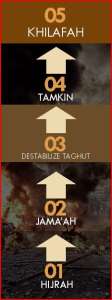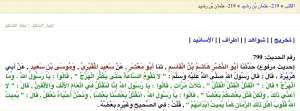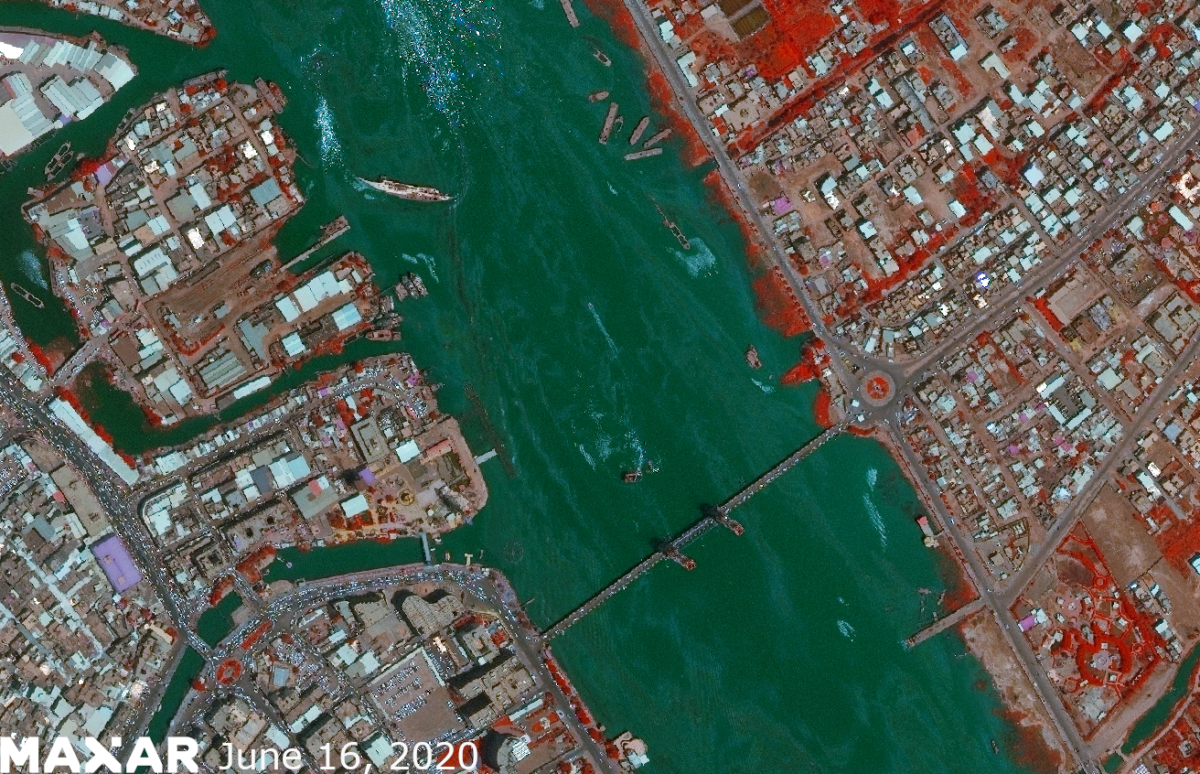Some Remarks on the Islamic State's First Issue of Dābiq Magazine
Introduction:
After the re-establishment of the Caliphate on the first day of Ramadan 1435 AH, June 29th 2014 AD (covered here), the ISIS slick propaganda machine took things to a whole other level. The Islamic State, as it was henceforth called, has since published two issues of its new “glossy” magazine: Dābiq.
In this post we will focus on the first issue of this magazine, published around the 20th of July 2014. We will look into the most remarkable details of this magazine and add some additional explanation where deemed necessary.
Dābiq 1 : The Return of the Khilafah
The magazine (a copy of which can be found here) opens quoting Abū Muṣ‘ab az-Zarqāwī, leader of al-Qaeda in Iraq (AQI) during the war in the mid 2000’s: The spark has been lit here in Iraq, and its heat will continue to intensify – by Allah’s permission – untilitburns the crusader armies in Dābiq. az-Zarqāwī was the first leader of the AQI, an organization that eventually led to the Islamic State in Iraq (ISI), from early 2013 known as the Islamic State in Iraq and as-Sham (greater Syria), and from now on named The Islamic State.
The reference to Dābiq, as the authors explain themselves on pages 4 and 5, stems from a Hadīth from Abu Hurayrah. Abu Hurayrah reported that the Prophet said:
“The Hour will not be established until the Romans land at al-A’maq or Dabiq (two places near each other in the northern countryside of Halab). Then an army from al-Madinah of the best people on the earth at that time will leave for them.
When they line up in ranks, the Romans will say, ‘Leave us and those who were taken as prisoners from amongst us so we can fight them.’ The Muslims will say, ‘Nay, by Allah, we will not abandon our brothers to you.’ So they will fight them.
Then one third of them will flee; Allah will never forgive them. One third will be killed; they will be the best martyrs with Allah. And one third will conquer them; they will never be afflicted with fitnah. Then they will conquer Constantinople. While they are dividing the war booty, having hung their swords on olive trees, Shaytan will shout, ‘The [false] Messiah has followed after your families [who were left behind.]’ So they will leave [for their families], but Shaytan’s claim is false.
When they arrive to Sham he comes out. Then while they are preparing for battle and filing their ranks, the prayer is called. So ‘Isa Ibn Maryam (‘alayhis-Salam) [referring to Jesus, the last Islamic Prophet before the Prophet Muhammad] will descend and lead them. When the enemy of Allah sees him, he will melt as salt melts in water.
If he were to leave him, he would melt until he perished, but he kills him with his own hand, and then shows them his blood upon his spear” [Sahih Muslim].
By referring to his Hadīth the tone for a large bit of this first issue of Dābiq is set. As pointed out in this excellent article by Michael W.S. Ryan, The Islamic State hereby [puts] this eschatology in such a prominent place, the magazine attempts to connect Islamic State and its new caliph to a cosmic purpose, obviously meant to have a romantic appeal to recruit young men looking for a cause.
But there are far more explicit calls to join The Islamic State further on in the article. On page 11 there are direct calls for Muslims from all over the world to join the Caliphate:
Quote 1:
A Call to Hijrah
Amir ul-Mu’minin said:“Therefore, rush O Muslims to your state. Yes, it is your state. Rush, because Syria is not for the Syrians, and Iraq is not for the Iraqis. The earth is Allah’s. {Indeed, the earth belongs to Allah. He causes to inherit it whom He wills of His servants. And the [best] outcome is for the righteous} The State is a state for all Muslims. The land is for the Muslims, all the Muslims. O Muslims everywhere, whoever is capable of performing hijrah (emigration) to the Islamic State, then let him do so, because hijrah to the land of Islam is obligatory.”
Quote 2:
A call to all Muslim doctors,engineers, scholars, and specialists
Amir ul-Mu’minin said: “We make a special call to the scholars, fuqaha’ (experts in Islamic jurisprudence), and callers, especially the judges, as well as people with military, administrative, and service expertise, and medical doctors and engineers of all different specializations and fields.
We call them and remind them to fear Allah, for their emigration is wajib ‘ayni (an individual obligation), so that they can answer the dire need of the Muslims for them. People are ignorant of their religion and they thirst for those who can teach them and help them understand it.
So fear Allah, O slaves of Allah”
On page 13 The Islamic State stresses the point how they have been supported by the tribes in Iraq; among more they claim to have been pumping millions of dollars into services for the Muslims in Iraq, they provide security and stability in the areas under their control, they ensured the population in these areas had enough food (particularly bread), reduced the crime rate (due to the draconian implementation of Islamic Law in IS controlled areas, see here for an example).
On pages 20 and following the authors explain the concept of Imāma (Leadership) to justify the establishment of their Caliphate in five parts:
- The concept of Imamah (Leadership) is from the Millah (Path) of Ibrahim – [Introduction] – again referring to some Ahadith
- Examples of narrations reported interpreting Imamah to mean political Imamah (using a rather weird background pic; a wolf or dog is looking upon a flock of sheep)
- The concept of Imamah (Leadership) is from the Millah (Path) of Ibrahim
Interesting quote here: ” … the people today have failed to understand that Imamah in religious affairs cannot be properly established unless the people of of truth first achieve comprehensive political Imamah over the lands and the people.” - The Commands of Allah to Ibrahim
- The Islamic State is a true Imamah
Page 29 is quite clear about the enemies of The Islamic State: … we will strike the neck of anyone – whoever he may be – that attempts to usurp this leadership, and we will remain patient in the face of such tribulation with the help of Allah Al-Hakim (the Most Wise) and Al-Mannan (the Most Gracious).
A most interesting part of this first issue of Dābiq is when they open a section titled The Islamic State in the Words of the Enemy. In this particular piece the authors quote David Ollivant and Brian Fishman; as they call them “former Director for Iraq at the US National Security Council, and (…) former Director of Research for the Combating Terrorism Center at West Point – two American crusaders – wrote an article titled “The Reality of the Islamic State in Iraq and Syria” a short time before the Islamic State’s liberation of Mosul as well as other important cities and towns in Iraq.
Quote 1: ISIS has created a multi-ethnic army; almost a foreign legion, to secure its territory.
Quote 2: The group does not have safe haven within a state. It is a de facto state that is a safe haven.
On page 36 the authors again refer to a Hadīth: “Hijrah will not cease as there is jihad” [Ahmad]. In another narration, he said “Hijrah will not cease as long as the kuffar are fought” [An-Nisa’i].
The rhetoric continues on the next page: “Thus, by using methods that led to maximum chaos and targeting apostates of all different backgrounds, the mujahidin were able to keep Iraq in constant instability and war, never allowing any apostate group to enjoy a moment of security.”
This was all while they launched daily operations against the crusader forces in Iraq whose main goal was to set up an apostate puppet regime loyal to them.
A most important section focuses on how to build an Islamic State:
- Immigrate to a land with weak control and authority
- recruit
- train
- take control over rural areas then attack major cities
- by increasing the chaos to a point leading to the complete collapse of the Taghut regime in entire areas, a situation some refer to as “tawahhush” (“mayhem”)
- to fill the vacuum into a full-fledged state
On the very same page there is a referral to Abū Bakr Najī‘s Idārat at-Tawahhush (The Management of Savagery – the original text: Arabic and English as translated by William McCants). This text, dating back to 2004, was written by al-Qaeda ideologue Abū Bakr Najī. It clearly refers to the stages an Islamic State would have to go true before they can re-install the Caliphate.
There is a Hadīth referring to this particular stage in Islamic history as well. This particular fragment of it was posted by Hicham Chaïb, a Belgian IS fighter in ar-Raqqa province in Syria:
Translation: The Prophet of God (Praise be upon him) said: the [last] hour will not come untill the chaos (Harj) increases. They said: and what is Harj O Prophet of God; he said: the killing, the killing.
Here is the full text of previously mentioned Hadīth:
In conclusion The Islamic State’s authors write: May Allah protect this Khilafah state and continue guiding it until its legions fight the crusader armies who will gather near Dābiq.
The last few pages the magazine deal with major recent events marking the steady rise of the Islamic State in Iraq.
The last page entirely quotes previously mentioned Hadith again, as it was a short summary and above all reminder …
Abu Hurayrah reported that Allah’s Messenger (sallallahu ‘alayhi wa sallam) said, “The Hour will not be established until the Romans land at al-A’maq or Dabiq (two places near each other in the northern countryside of Halab).
Then an army from al-Madinah of the best people on the earth at that time will leave for them. When they line up in ranks, the Romans will say, ‘Leave us and those who were taken as prisoners from amongst us so we can fight them.’
The Muslims will say, ‘Nay, by Allah, we will not abandon our brothers to you.’ So they will fight them.
Then one third of them will flee; Allah will never forgive them. One third will be killed; they will be
the best martyrs with Allah. And one third will conquer them; they will never be afflicted with fitnah.
Then they will conquer Constantinople. While they are dividing the war booty, having hung their
swords on olive trees, Shaytān will shout, ‘The [false] Messiah has followed after your families [who were left behind.]’ So they will leave [for their families], but Shaytan’s claim is false. When they arrive to Sham he comes out.
Then while they are preparing for battle and filing their ranks, the prayer is called. So ‘Isa Ibn Maryam (‘alayhis-Salam) will descend and lead them.
When the enemy of Allah sees him, he will melt as salt melts in water. If he were to leave him, he would melt until he perished, but he kills him with his own hand, and then shows them his blood upon his spear.”
[Sahih Muslim]
Pieter Van Ostaeyen
Master of History, KUBrussel & KULeuven 1999
Master of Arabic & Islamic Studies, KULeuven 2003
twitter: @p_vanostaeyen blog: pietervanostaeyen.wordpress.com





